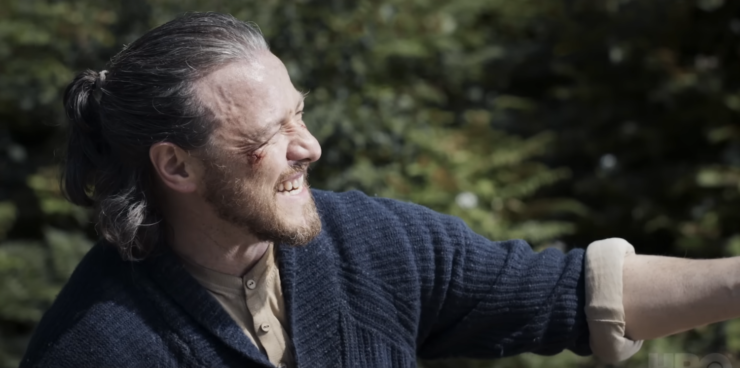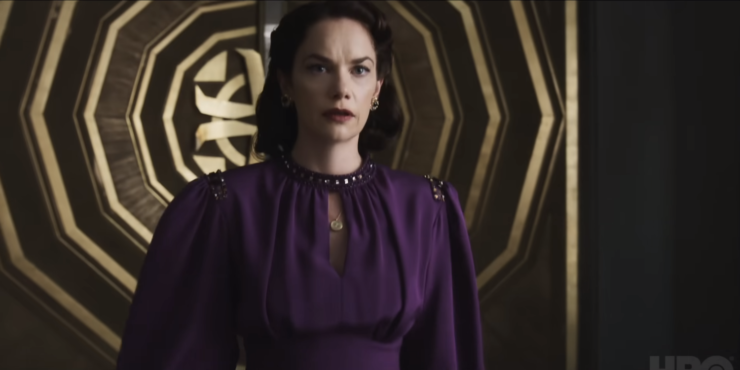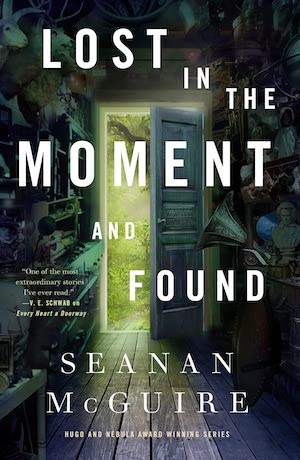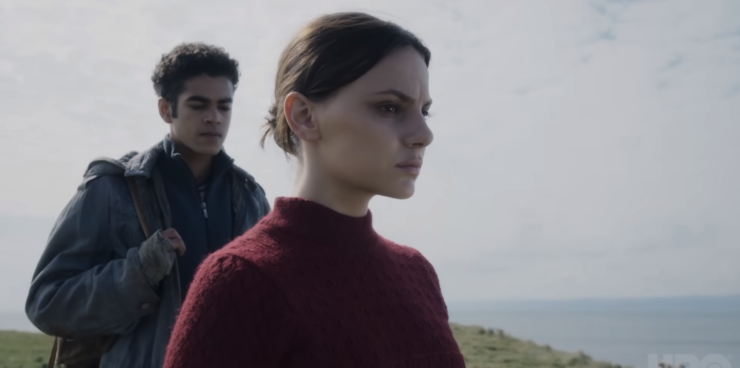The third and final season of His Dark Materials—corresponding to The Amber Spyglass, the last book in the original Phillip Pullman trilogy—has quite the job ahead of it. Not only must it bring a satisfying end to a multiversal story of war in the cosmos, but it must do so while tackling what I feel is the weakest book in the series.
The Amber Spyglass is certainly not a book devoid of merit. I have fond memories of some of its pivotal moments and it sticks its emotional gut-punch of a landing in a way that is incredibly impressive. But it also the book where Pullman’s anti-Catholic politics really come to the fore, making for some clunky, preachy, and ultimately muddled lessons that work best when the focus is on Lyra and Will. Too often in this last volume, that is not the case. Additionally, the show itself has to make up for lost time. Having taken a year off during the pandemic after filming the first two seasons concurrently, its child actors have aged noticeably, and several recasts have shaken up the production.
But, for all the anticipatory worry about what the last season of this uneven but occasionally sublime series will look like, the first two episodes (“The Enchanted Sleeper” and “The Break”) seem to ensure that, at the very least, it will continue to be a mostly satisfying journey and a phenomenal showcase for Ruth Wilson.
The Bad

The first episode begins with a voiceover from the leader of the rebel angels, Xaphania (now played, serviceably, by Chipo Chung though leaving us with a wistful yearning for what Sophie Okonedo, who originated the role, might have done with it). Unfortunately, this voiceover makes the baffling choice to deliver Pullman’s anti-theistic coup de grace as leaden exposition–so leaden that Lord Asriel (James McAvoy) repeats it in a later scene. Pullman’s desire to create a Narnia for atheist and agnostic children underlies the whole of the trilogy, of course. But it is in The Amber Spyglass that he makes his most savage critiques of Christian (specifically Catholic) theology while also never fully managing to argue for something productive and thoughtful that isn’t, ultimately, rooted in Christianity. The major revelation in question is that the Authority, the God worshiped by the Magisterium and countless other Christian and Christian-adjacent religions across the multiverse, isn’t the creator of the universe—he was just the first being to awaken and subsequently lied about his role in order to consolidate power.
It is a clever subversion of the Christian mythology that Pullman wants to push back against and the most succinct articulation of the trilogy’s lesson: all hierarchy leads to fascism and the concept of hierarchy itself is built on a lie. In the novel, Pullman has this revelation given to Will by the rebel angel, Balthamos (played in the show by Kobna Holdbrook-Smith) when the whole cosmic order and its secret truths are revealed. The show, in delivering this key information without dramatic import, undermines so much of what Pullman suggests is the problem with religious dogma.
Now, it may well be that this is part of a larger retooling of Pullman’s message, with invective leveled at a different aspect of Christian dogma later in the show. Perhaps, given that the anti-Catholic aspect of the final novel is one of the weaker distractions from what makes the series so beloved, this may even, ultimately, be a good thing. As it stands, however, it feels like a pacing issue–taking one of the most important moments in the books and cramming it in as barely registered backstory.
Similarly, the introduction of a queer, angelic couple in Balthamos and his partner, Baruch (Simon Harrison), is immediately followed by Baruch’s murder, resulting in yet another instantiation of the tired and terrible “bury your gays” trope. This is, of course, a plot point from the original novel which, unlike the show, at least has the (minor and not exonerating) benefit of being twenty-two years older. Given the way that Balthamos and Baruch function in the plot, Baruch’s murder is likely the most expedient way to move the plot along, and simply writing out a queer couple in order to avoid the problem feels like its own sort of messy erasure so I do not envy the writers the bind they were in. That said, it is still disappointing to see and, perhaps, bodes ill that the showrunners left this section of the story essentially unchanged from the original.
The Good

One pleasant update from Pullman’s original is the expansion of the character of Ogunwe (Adewale Akinnuoye-Agbaje). In Pullman’s book, the character is King Ogunwe, the commander of Lord Asriel’s armies and the leader of an unnamed African nation who has a cheetah as a daemon. In the show, he is referred to as General Ogunwe and is the imprisoned leader of a resistance movement in a daemonless world. He serves as an audience surrogate for introducing Lord Asriel’s rebel encampment—the Republic of Heaven—and also as a foil for Asriel’s parental neglect: fighting to make the world safe for his one remaining daughter while Asriel ignores Lyra to wage war on God. Akinnuoye-Agbaje is always a welcome presence on any show, and he lends some humanity and skepticism to the scenes in Asriel’s camp, which helps to flesh out the stakes and the combatants in the coming war in a way that Pullman’s novel never really manages.
It is also, of course, a relief to see Ogunwe no longer an African king and cheetah warg whose nation can’t even be named. Pullman’s worldbuilding is intriguing and Lyra’s world is full of half-described historical tidbits that draw the reader in without indulging in tedious exposition about exactly how her world differs from ours. Unfortunately, a lot of what does get mentioned reveals Pullman’s propensity towards exoticizing non-European parts of the world with racist depictions of Turks, Tartars, and other central Asian peoples. Freeing Ogunwe from this narrative is a relief, and something of a surprise given how the first season used Pullman’s racist plot points seemingly without consideration or alteration.
The show also manages to drum up some intrigue within Asriel’s camp with the interrogation of the angel that murdered Baruch: the Archangel Alarbus (Wade Briggs), a character invented for the show. The conversation between Asriel and the angel does a lot of good work in reminding the audience that Asriel is both morally repulsive and also, technically, on the right side of history—a tricky position that Briggs, McAvoy, and the writers pull off dexterously. It even introduces a new subversion of Christian theology that might play out as an interesting bit of character development. Alarbus tells Asriel that he, the upstart rebel, is so insignificant that the Authority doesn’t even know his name. Asriel repeats the line with a look of momentary vulnerability—a testament to both his ego and that the idea of an all-knowing God who at least is aware of his subjects, if not kindly disposed towards them, is a lie. We’ll see if the show follows up on this in the weeks to come.
Buy the Book


Lost in the Moment and Found
Asriel is also given more depth than in the novels or the previous seasons, arguing with his daemon (played gamely by Victoria Hamilton, who has the impossible task of taking over for the sadly deceased and utterly irreplaceable Helen McCrory) over whether or not he really does care about his estranged daughter, deep down. Pullman wrote great and detestable villains in Asriel and Mrs. Coulter, and thus far, the show has done an excellent job of humanizing them without softening their edges or pulling their punches. If His Dark Materials does one thing flawlessly, it’s give Lyra’s monstrous parents their due.
Which of course leads us to the best thing in these first two episodes: Ruth Wilson’s continued tour-de-force performance as Marisa Coulter. The first few chapters of The Amber Spyglass are where Pullman first gives his iconic villain any sort of depth, and that depth mostly comes from her burgeoning maternal feelings for the unconscious Lyra, whom she is holding hostage. Wilson and the writers have already far surpassed Pullman’s characterization in the course of the previous two seasons, folding in complex layers: ruthlessness, self-loathing, an achingly sad need to be validated, and genuine love for her daughter that she is constitutionally incapable of expressing in a healthy way.
These first two episodes show us a Marisa Coulter at her lowest and most desperate. It’s the first time she genuinely doesn’t have a plan for what comes next and, while she remains a superb manipulator, giving pause to both Will (Amir Wilson) and the Church Assassin, Father Gomez (Jamie Ward), Ruth Wilson imbues her with a defeated listlessness, her eye twitching as the jaws of the vise close in around her. In her hands, Marisa Coulter is the world’s most vulnerable sociopath who viewers can both love and love to hate all at once, or by turns over the span of a sentence.
His Dark Materials is a show with a lot to accomplish in the next six episodes. It has to stay true to its near-perfect coming-of-age love story. It has to land its critique of dogmatic religious fervor without falling into the same pitfalls that Pullman’s novel did. It has to be a surprisingly adult story about failed parenthood. And it has to do all that while asking us to buy into a beatific race of as-yet-unseen alien elephants on wheels. It may not stick the landing as well as Pullman did. It may not ever veer into the nosedive that the middle of the novel threatened. But if there is one thing worth watching, it’s the magnetic performance of Ruth Wilson and the complete apotheosis of Marisa Coulter, Pullman’s best creation.
***
What did you think of the first two episodes? And what are you hoping to see as the rest of the season unfolds over the next few weeks? With the series finale airing on December 26th, we won’t have long to wait to see if His Dark Materials manages to bring its complex, multifaceted story to a satisfying conclusion…
Tyler Dean is a professor of Victorian Gothic Literature. He holds a doctorate from the University of California Irvine and teaches at a handful of Southern California colleges. He is the author of “Distended Youth: Arrested Development in the Victorian Novel” and his article “Exhuming M. Paul: Carmen Maria Machado and Creating Space for Pedagogical Discomfort” appears in the most recent issue of Victorian Studies. He is one half of the Lincoln & Welles podcast available on iTunes or through your favorite podcatcher. His fantastical bestiary can be found on Facebook at @presumptivebestiary.










